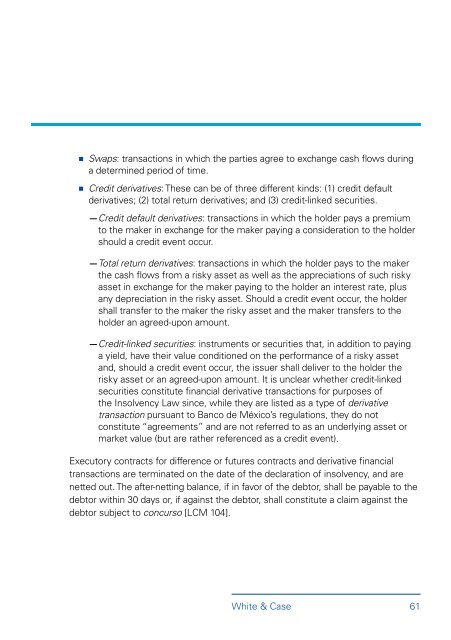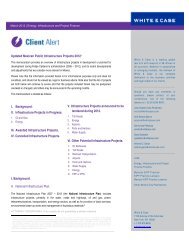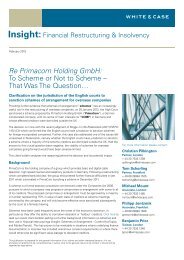Mexican Legal Framework of Business Insolvency - White & Case
Mexican Legal Framework of Business Insolvency - White & Case
Mexican Legal Framework of Business Insolvency - White & Case
You also want an ePaper? Increase the reach of your titles
YUMPU automatically turns print PDFs into web optimized ePapers that Google loves.
■ ■ Swaps:<br />
transactions in which the parties agree to exchange cash flows during<br />
a determined period <strong>of</strong> time.<br />
■ ■ Credit derivatives:<br />
These can be <strong>of</strong> three different kinds: (1) credit default<br />
derivatives; (2) total return derivatives; and (3) credit-linked securities.<br />
— Credit default derivatives:<br />
transactions in which the holder pays a premium<br />
to the maker in exchange for the maker paying a consideration to the holder<br />
should a credit event occur.<br />
— Total return derivatives:<br />
transactions in which the holder pays to the maker<br />
the cash flows from a risky asset as well as the appreciations <strong>of</strong> such risky<br />
asset in exchange for the maker paying to the holder an interest rate, plus<br />
any depreciation in the risky asset. Should a credit event occur, the holder<br />
shall transfer to the maker the risky asset and the maker transfers to the<br />
holder an agreed-upon amount.<br />
— Credit-linked securities:<br />
instruments or securities that, in addition to paying<br />
a yield, have their value conditioned on the performance <strong>of</strong> a risky asset<br />
and, should a credit event occur, the issuer shall deliver to the holder the<br />
risky asset or an agreed-upon amount. It is unclear whether credit-linked<br />
securities constitute financial derivative transactions for purposes <strong>of</strong><br />
the <strong>Insolvency</strong> Law since, while they are listed as a type <strong>of</strong> derivative<br />
transaction pursuant to Banco de México’s regulations, they do not<br />
constitute “agreements” and are not referred to as an underlying asset or<br />
market value (but are rather referenced as a credit event).<br />
Executory contracts for difference or futures contracts and derivative financial<br />
transactions are terminated on the date <strong>of</strong> the declaration <strong>of</strong> insolvency, and are<br />
netted out. The after-netting balance, if in favor <strong>of</strong> the debtor, shall be payable to the<br />
debtor within 30 days or, if against the debtor, shall constitute a claim against the<br />
debtor subject to concurso [LCM 104].<br />
<strong>White</strong> & <strong>Case</strong><br />
61
















